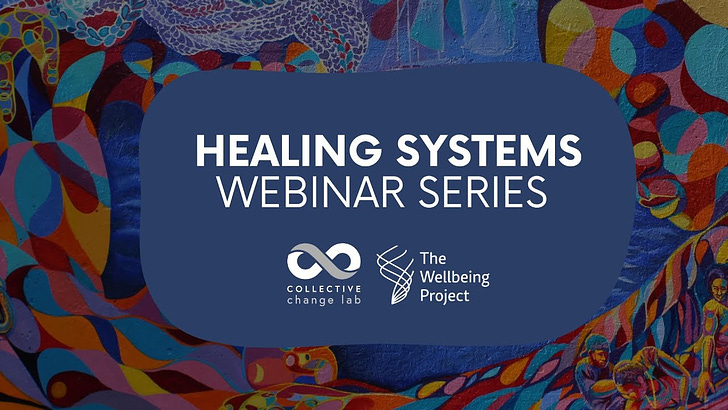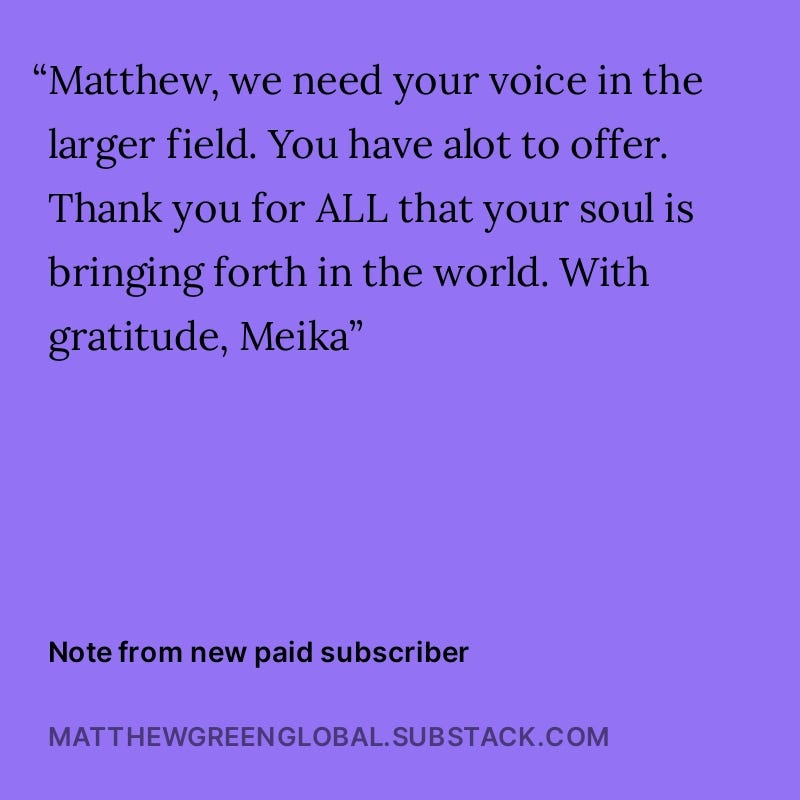Forward This When Words Fail
A new article in Stanford Social Innovation Review deserves to go viral.
Resonant World now has more than 1,000 subscribers in countries from the United States and Australia, to South Africa and Colombia. Of these, 28 are paying supporters — to whom I’m profoundly grateful. This newsletter serves the global movement working to heal individual, inter-generational and collective trauma — sharing, commenting, or subscribing, helps reach more people. Thank you!
And if you enjoy Resonant World, you may also enjoy my other newsletter, Toxic Workplace Survival Guy:
“I think a collaboration is needed between the fields of trauma healing, collective healing and systems change to weave not only new practices, but to birth together new environments and cultures of care and well-being.” — Laura Caldéron de la Barca
Resonant World#69
Good news:
If — like me — you’ve ever struggled to explain to somebody why you’re so convinced that trauma healing work holds the key to solving the world’s most intractable crises, then help is at hand. (Resonant World#55).
A new article breaks down why understanding trauma isn’t just essential for helping individuals — it’s a key ingredient for delivering the kinds of systems-level change we need to preserve a liveable planet.
Authors Laura Caldéron de la Barca, John Kania and Katherine Milligan of the Collective Change Lab teamed up with with partners led by the Wellbeing Project and Georgetown University to interview dozens of social change, Indigenous, and community leaders from places as far afield as Sri Lanka, Romania, Australia, New Zealand, Colombia, India, and the United States.
Their beautifully written essay in Stanford Social Innovation Review shows why attempts to transform companies, systems of government or other institutions often founder due to the unacknowledged influence of collective trauma. (Resonant World#4).
Laura, John and Katherine write:
“Trauma is a near-universal part of the human experience and an invisible force contributing to the “stuckness” of virtually all social systems—including child welfare, criminal justice, education, health care, and housing—even as humanity barrels headlong into the most destructive systemic breakdown of all: the climate crisis that threatens life on Earth.
“Yet the impact of trauma remains all but absent from mainstream discourse about systems change. Part of the reason is that we have a common tendency to believe trauma is “out there”—that other people are traumatized and need help, but we’re fine—when in fact we all carry trauma. The trauma we carry affects the way we look at the world and ourselves, and therefore plays a role in determining the future course of social systems. Unless we acknowledge trauma, engage with it, and find ways to support individual and collective healing, our systems will stay stuck.”
‘Teacher and Guide’
I admit I’m biased:
I’m privileged to know Laura via the two-year Timeless Wisdom Training on trauma healing principles with Thomas Hübl and team. And I interviewed Laura, John and Katherine in November for the short video above, when their essay was in draft form.
I asked Laura just now if she had anything she’d like to emphasize about their findings, and she told me:
“The other big message that I think bears mentioning is the invitation to engage in collective healing, and the challenge of adapting and embracing adequate healing practices for spaces that were not originally designed for healing.
“I think a collaboration is needed between the fields of trauma healing, collective healing and systems change to weave not only new practices, but to birth together new environments and cultures of care and well-being.
“But that requires that we do not bypass the past that remains unintegrated. We need to bring our talents together and attend to our own healing as the teacher and guide in this process, in my view.”
Laura’s call to join forces to create new “environments and cultures of care and well-being” feels very resonant to me.
Now the article is live, it can serve as one manifesto for the global healing movement: academically rigorous yet accessible; broad in scope; and rooted in a deep understanding of both trauma and the practice of systems change.
I wrote a summary of some of the key findings in Resonant World#55. But please do take a look at the entire article and — more importantly — share it.
Resonant World is written in the gaps between my work editing investigations at nonprofit climate news service DeSmog. It’s a huge boost when people become paid subscribers, and support of any amount affirms that my mission to support the global community of practitioners engaged in integrating individual, inter-generational and collective trauma has value. Thank you!
What People Are Saying About Resonant World







Wow, this is great! I haven't yet read the article, but I will do so now.
It's obvious to me that these statements about the relationship between trauma and efforts to transform communities of all kinds is importantly true. In particular, relational trauma is woven deeply into the fabric of the dominant / dominator culture. Indeed, relational trauma almost entirely explains and defines the dominant / dominator culture's behavior and habits. (Relational trauma isn't best understood as exclusively about "attachment disturbances" between children and their adult caregivers or parents. It's bigger than that by far, and extends into the entire relational field. But you know that.)
I posted a link to this post in the Deep Tranformation Network space. Are you the Matthew Green who is registered there at DTN? It might be good to encourage discussion on this topic and theme there in DTN. I surely would like to discuss it further.
I believe there is a serious problem with this quote:
“Trauma is a near-universal part of the human experience and an invisible force contributing to the “stuckness” of virtually all social systems—including child welfare, criminal justice, education, health care, and housing—even as humanity barrels headlong into the most destructive systemic breakdown of all: the climate crisis that threatens life on Earth."
The quote is otherwise insightful and brilliant, but it is wrong to frame "the most destructive systemic breakdown on Earth" as "the climate crisis". Indeed, now that the climate crisis has gained so much awareness and attention, as such, it's now time to re-frame that crisis as one of the many symptoms of a metacrisis or polycrisis. There is the overall ecological polycrisis / metacrisis, which itself is a subset of a larger metacrisis. This ecological crisis, which is a crisis of overshoot (not merely of population numbers, but of ecological harms), has to be addressed as a whole. And we can't do this when we frame the climate crisis as independently existing, rather than woven together with the biodiversity crisis ... and all of the transgressions of planetary boundaries (as listed here -https://www.stockholmresilience.org/research/planetary-boundaries.html )
Just last week I toured Laura Plantation in Vacherie, LA, an incredible history tour of a family and the enslavement of over 100 people when it was a sugar plantation. Towards the end of the tour, I whispered to the tour guide—this is really a culture built on trauma. She was taken aback, then leaned in and said, I don’t think I could have said that any better myself. All the frustration and books and scholarship and marching and riots and bloodshed from the years of this stained US history is frankly the most rational response of generational survivors wanting to be heard and their pain acknowledged. As someone who experienced childhood trauma, I see this so clearly. Glad it’s beginning to land thinking and a framework around it.